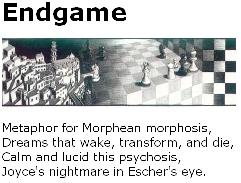In Memory of
Guy Davenport
From the day Davenport died:

“At Merton College, Oxford,
he wrote the first thesis on Joyce
to be accepted by the university.”
From a very informative essay
on Davenport’s aesthetics:
“T.S. Eliot’s experiments
in ideogrammatic method
are equally germane to Davenport,
who shares with the poet
an avant-garde aesthetic and
a conservative temperament.
Davenport’s text reverberates
with echoes of Four Quartets.”
— Andre Furlani
“At the still point, there the dance is.”
— T. S. Eliot, Four Quartets,
quoted in the epigraph to
the chapter on automorphism groups
in Parallelisms of Complete Designs,
by Peter J. Cameron,
published when Cameron was at
Merton College, Oxford.
See also
Elegance.
The comments and references herein about Guy Davenport are pertinent. This medium (the web log) is new to me and a bit confusing. Non-linear, a virtual Mobius strip perhaps. (I’m not sure to whom this comment is directed even, I am hoping to Mr. Culliname).
Guy Davenport was Associate Prof. of English, Univ. KY, when I signed up for his class ENG 551 AM LIT BEFORE 1860, spring semester 1967. I took his class on the recommendation of a fellow student who told me once (at a party) that Davenport, like a rooster, strutted before his class talking about everything under the sun while making chalk-line sketches on the black board which often included words in Greek and Latin. Although I started at the American College in Paris (fall 1962), my university education began with Professor Davenport’s class that spring of 1967. In retrospect, Am Lit before 1860, included, in addition to readings from the works of Jonathan Edwards, Cotton Mather, Anne Bradstreet, and ‘American rennaissance’ masters Thoreau, Poe, Margaret Fuller, Hawthorne, Emerson, Melville, Whitman, Davenportian vectors into English and American political history, transcendental philosophy, art, geology (Hugh Miller, geologist, a subject Davenport said he wanted to write more about), and only God (and Davenport) knows what else. His letters and conversations, over nearly forty years, have sustained me. I miss him. With his death 4 January 2005 (aet. 77), his readers will mourn him, but they would be wise to celebrate his full and meaningful life. All whoever sat in his classes and seminars should be grateful for the experience of having had before them the Daimon of Herakleitos, the radiance of shared thought, and the love of learning.
Chuck Ralston
Comment by paideuma — Wednesday, January 12, 2005 @ 11:28 am
I appreciate your comment very much (and yes, it was directed properly to me). If, as Socrates (who had his own Daimon) and Eliot thought, there is an afterlife, I hope Professor Davenport is happy there since he seems to have often been the cause of happiness in others.
Comment by m759 — Wednesday, January 12, 2005 @ 12:22 pm